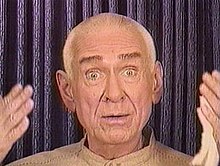
Back مارشال أبليوايت Arabic Marshall Applewhite Catalan Marshall Applewhite German Marshall Applewhite Spanish Marshall Applewhite Finnish Marshall Applewhite French Marshall Applewhite ID Marshall Applewhite Icelandic Marshall Applewhite Italian マーシャル・アップルホワイト Japanese
Marshall Applewhite | |
|---|---|
 Applewhite in an initiation video for Heaven's Gate in 1996 | |
| Born | Marshall Herff Applewhite Jr. May 17, 1931 |
| Died | March 26, 1997 (aged 65) Rancho Santa Fe, California, U.S. |
| Cause of death | Suicide by suffocation |
| Other names | Do, Tiddly, Nincom, Guinea |
| Alma mater | Austin College (BA) University of Colorado (MA) |
| Known for | Founder of Heaven's Gate |
| Spouse |
Ann Pearce
(m. 1952; div. 1968) |
| Children | 2 |
| Parent(s) | Marshall Herff Applewhite Sr. (father) Louise Applewhite (mother) |
Marshall Herff Applewhite Jr. (May 17, 1931 – March 26, 1997), also known as Do,[a] among other names,[b] was an American religious leader who founded and led the Heaven's Gate new religious movement (often described as a cult), and organized their mass suicide in 1997. The suicide is the largest mass suicide to occur inside the U.S.[1]
As a young man, Applewhite attended several universities and served in the United States Army. He initially pursued a career in education until he resigned from the University of St. Thomas in Houston, Texas, in 1970, citing emotional turmoil. His father's death a year later brought on severe depression. In 1972, Applewhite developed a close friendship with Bonnie Nettles, a nurse; together, they discussed mysticism at length and concluded that they were called as divine messengers. They operated a bookstore and teaching center for a short while and then began to travel around the U.S. in 1973 to spread their views. They gained only one convert. In August 1974, Applewhite was arrested in Harlingen, Texas, for failing to return a rental car and was extradited to Missouri where he was subsequently jailed for six months. In jail, he further developed his theology.
After Applewhite's release, he and Nettles travelled to California and Oregon, eventually gaining a group of committed followers. They told their followers that they would be visited by extraterrestrials who would provide them with new bodies. Applewhite initially stated that he and his followers would physically ascend to a spaceship, where their bodies would be transformed, but later he came to believe that their bodies were the mere containers of their souls, which would later be placed into new bodies. These ideas were expressed with language drawn from Christian eschatology, the New Age movement and American popular culture.
Heaven's Gate received an influx of funds in the late 1970s, which it used to pay housing and other expenses. In 1985, Nettles died, leaving Applewhite distraught and challenging his views on physical ascension. In the early 1990s, the group took more steps to publicize their theology. In 1996, they learned of the approach of Comet Hale–Bopp and rumors of an accompanying spaceship, concluding that this was the vessel that would take their spirits on board for a journey to another planet. Believing that their souls would ascend to the spaceship and be given new bodies, the group members committed mass suicide in a rented mansion. A media circus followed the discovery of their bodies. In the aftermath, commentators and academics discussed how Applewhite persuaded people to follow his commands, including suicide. Some commentators attributed his followers' willingness to commit suicide to his skill as a manipulator, while others argued that their willingness was due to their faith in the narrative that he constructed.
Cite error: There are <ref group=lower-alpha> tags or {{efn}} templates on this page, but the references will not show without a {{reflist|group=lower-alpha}} template or {{notelist}} template (see the help page).
© MMXXIII Rich X Search. We shall prevail. All rights reserved. Rich X Search